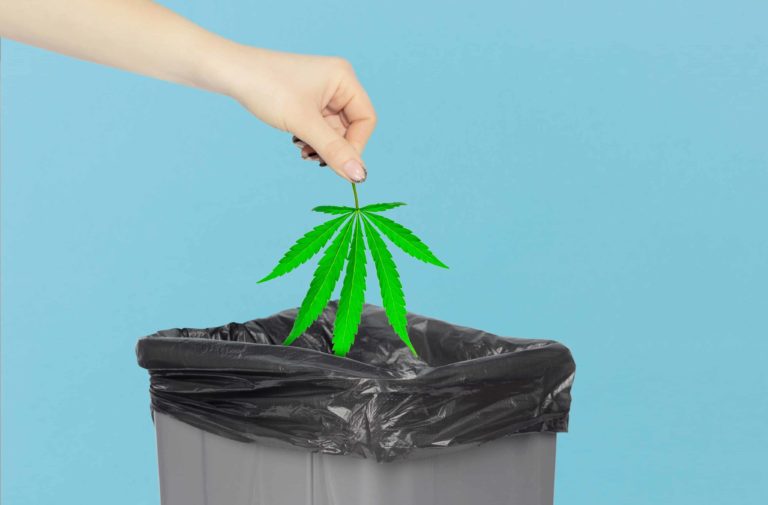
[ad_1]
The Danish Parliament’s Health Committee recently stated that it has destroyed more than 145,541 kilograms (or approximately 320,862 pounds) of cannabis, measured in dry weight. According to a parliamentary inquiry response, the committee has also issued 303 permits to undergo the destruction of the plant material.
According to an email obtained by MJBizDaily, the destroyed cannabis all comes from companies who are permitted to cultivate in Denmark through its pilot program. Any cannabis cultivated after the growers received approval to participate in the pilot program.
The pilot program, “Act on a Medical Cannabis Pilot Programme,” was approved by the Danish government passed in 2017 and it went into effect starting on January 1, 2018. “The purpose of the pilot programme is to offer patients a lawful way of testing treatment with medicinal cannabis if they have experienced no benefits from authorised medicines. That is the intention with the programme,” the Danish government states on its website. It also states that the pilot program has an end date of December 31, 2025.
The country has approved 11 companies to manufacture cannabis products in Denmark: Aurora Nordic Cannabis A/S, DanCann Pharma A/S, Little Green Pharma Denmark ApS, MEDICAN A/S, Movianto Nordic ApS, Schroll Medical ApS, Sterigenics Denmark A/S, Tetra Pharm Technologies ApS, Valcon Medical A/S, Valeos Pharma A/S, and Vertanical Denmark ApS. Each is authorized to cultivate or manufacture cannabis through one of four permits, including approval for the pilot program, pharmaceutical manufacturing, propagating plants, and the “development authorization.”
The development authorization “scheme,” as it’s referred to on the Denmark government website, also began on January 1, 2018. “Under this scheme, companies can apply for an authorisation to cultivate and handle cannabis with a view to producing cannabis suitable for medicinal use,” the government states. “Cannabis developed under the development scheme cannot be used in the pilot programme or for other medicinal purposes.”
The government explains that the development authorization permit was created “…to give companies the opportunity to develop cultivation and production methods so that they could be ready to apply for a permit in the pilot scheme,” the government states in an official document that was translated.
According to MJBizDaily, a Danish Medicines Agency spokesperson explained that the 145,541 kilograms of destroyed cannabis is a combined total of cannabis that comes from any of the four permit types, and that there’s no way to confirm how much of it was made for the pilot program specifically.
The Danish government agency didn’t confirm exactly why the cannabis was destroyed. The parliamentary inquiry only partially stated that it was due to “faulty productions, discarded products including imported products and all cannabis cultivated in the development scheme are also included in the stated quantity.” All of the cannabis contained more than 0.2% THC.
The amount of cannabis destroyed in Denmark was at an all time high in 2023, compared to previous years. In 2022, the Danish Medicines Agency described “lost or destroyed cannabis” specifically not related to the pilot program amounted to 10,753 kilograms (23,706 pounds).
Alternatively, in 2019 Denmark medical cannabis pilot program approved companies produced 2,112 kg (4,656 pounds) in 2019, 6,587 kg (14,521 pounds) in 2020, and 32,433 kg (71,502 pounds) in 2021, with numbers not yet released for 2022.
Cannabis sales in Denmark have continued to grow as well, with about $30.8 million kroner (~US$2.8 million) in 2020, $64.3 million kroner (~US$5.9 million) in 2021, and $62.5 million kroner (~US$5.8 million) in 2022.
Destroying cannabis products aren’t uncommon in other countries either. Between January and December 2021, Canadian companies destroyed 425,325 kilograms (~937,681 pounds) of dried cannabis, as well as 40,454 kilograms (89,185 pounds) of extracts, 97,959 kilograms (21,5962 pounds) in edibles, and 3,940 kilograms (8,686 pounds) worth of topicals—all of which was categorized as “unpackaged.” Packaged cannabis destroyed in the same time frame amounted to 3,576,232 units of dried cannabis, 1,118,148 units of extracts, 2,421,823 units of edibles, and 15,359 units of topicals, according to Health Canada.
For Canada, reasons for destroying product “include, but are not limited to: crop losses; post-harvest disposal of unusable plant material (e.g., stalks); recalled products; and elimination of unsold or returned products,” a Health Canada spokesperson told High Times.
In the U.S., destroyed cannabis data relates to the seizure and destruction of illegal cannabis. In May, the Drug Enforcement Administration stated that it had seized more than 5,581,839 cannabis plants—90% of which were from California.
Earlier this month in Christiana, Denmark, a neighborhood commune that has long been associated with soft drug use, Copenhagen Mayor Sophie Hæstorp Andersen urged tourists to stop buying cannabis in the area to deter violence. “The spiral of violence at Christiania is deeply worrying,” Andersen said, asking “the hundreds of thousands of visiting tourists and the many new foreign students who have just moved to Copenhagen to stay away and refrain from buying weed or other drugs at Pusher Street.” This response was due to a shootout that occurred in the area on Aug. 26, which resulted in the death of a 30-year-old man.
[ad_2]
Source link